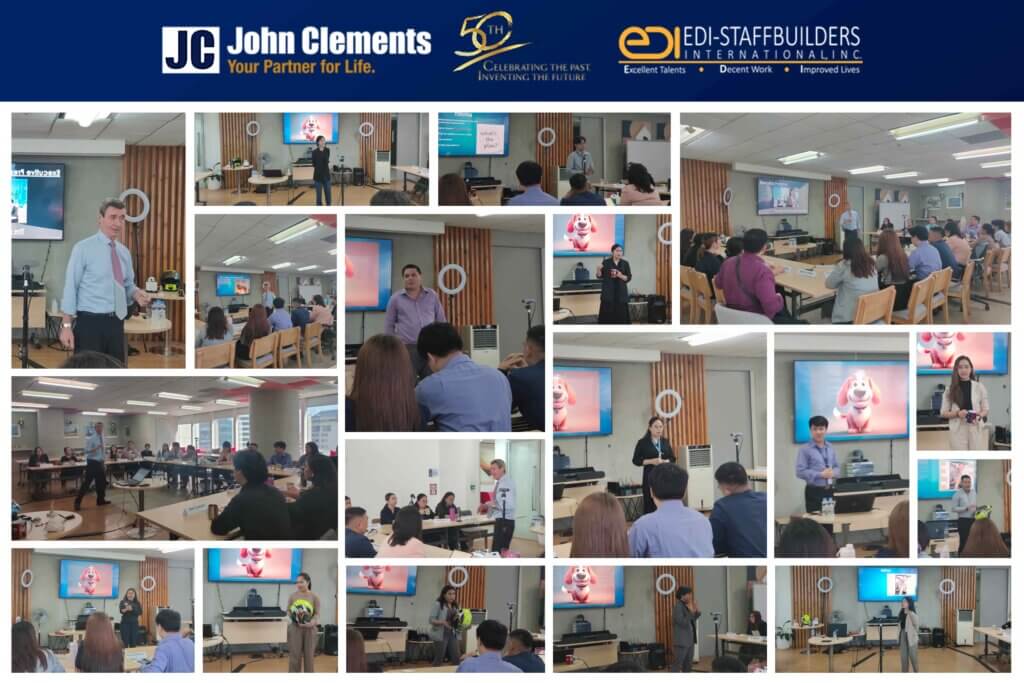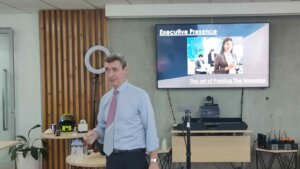As part of our ongoing efforts to elevate communication and presentation skills within John Clements, we hosted a transformative session on October 2, 2024. This session, facilitated by Michael Cannon, one of John Clements Leadership Institute’s discussion leaders, was titled “Engage, Inspire, Persuade.” It aimed to refine our team’s presentation skills through a series of insightful takeaways.
Executive Presence & Communication
Michael stressed that executive presence isn’t just about how you speak but how you carry yourself. A powerful presenter commands attention through eye contact, poised body language, and clear, concise communication. These elements are critical in leadership roles, sales presentations, and other professional settings. As Michael mentioned, strong presentations rely on preparation, including thorough research, rehearsals, and testing tech beforehand.
This focus on presentation skills resonated particularly with me. I’m no stranger to the common pitfalls—lack of audience interaction is one I’m guilty of (hence my attendance!). The importance of connecting with your audience cannot be overstated. Michael encouraged us to think on our feet and adapt to audience feedback in real time, ensuring we support their engagement.
Audience Engagement & Confidence
One of the key components of improving presentation skills is understanding your audience. Michael gave an invaluable reminder: use stories to connect, not just facts. It’s the personal touch that resonates. Eye contact, energy, and varied body language help build rapport and overcome nervousness.
We also discussed a critical aspect of presentation: confidence. Participants were encouraged to slow down and find a natural flow in our speeches. This might sound simple, but keeping an audience engaged requires constant practice and feedback—two-way communication is key. Michael’s real-life examples of public speakers missing audience cues drove home the importance of active listening.
Spontaneity & Preparation
Spontaneity can make or break a presentation. Michael shared how he personally struggled with public speaking early on, which served as a valuable lesson for all of us. The key to improving presentation skills is practice and preparation—two things that give us the confidence to improvise when necessary. The combination of precision and adaptability keeps the audience interested and helps the speaker stay in control.
Professionalism & Growth
Finally, we learned that strong presentation skills aren’t just about what we say but how we say it. Michael emphasized professionalism in appearance, tone, and behavior. Small habits, such as avoiding unnecessary mannerisms and controlling repetitive words like “okay” or “um,” can dramatically change how we’re perceived.
His feedback helped the participants recognize that great presentations are a balance of preparation, passion, and professionalism. Whether presenting to senior leaders or colleagues, refining our presentation skills is crucial to making a lasting impact. And with continued practice, we can all become more compelling, persuasive communicators.
Through sessions like these, we are not only improving individual skill sets but building a culture of excellence in communication. It’s not just about selling a product or idea—it’s about connecting, inspiring, and leaving a lasting impression.

Ready to Transform Your Leadership and Presentation Skills?
Whether you’re a seasoned executive or just starting your leadership journey, honing your presentation skills is key to making a lasting impact. At John Clements Leadership Institute, we offer tailored programs to help you build confidence, communicate effectively, and inspire your audience. Take the next step in your professional development and learn more about our leadership courses designed to elevate your presentation skills.






